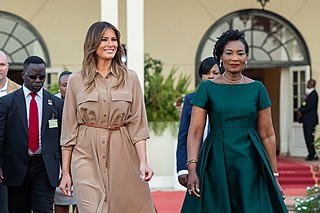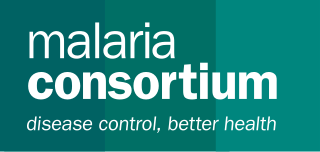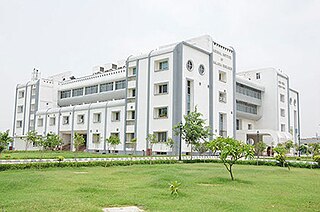
The Wellcome Trust is a charitable foundation focused on health research based in London, in the United Kingdom. It was established in 1936 with legacies from the pharmaceutical magnate Henry Wellcome to fund research to improve human and animal health. The aim of the Trust is to "support science to solve the urgent health challenges facing everyone." It had a financial endowment of £29.1 billion in 2020, making it the fourth wealthiest charitable foundation in the world. In 2012, the Wellcome Trust was described by the Financial Times as the United Kingdom's largest provider of non-governmental funding for scientific research, and one of the largest providers in the world. According to their annual report, the Wellcome Trust spent GBP £1.1Bn on charitable activities across their 2019/2020 financial year. According to the OECD, the Wellcome Trust's financing for 2019 development increased by 22% to US$327 million.
Tropical diseases are diseases that are prevalent in or unique to tropical and subtropical regions. The diseases are less prevalent in temperate climates, due in part to the occurrence of a cold season, which controls the insect population by forcing hibernation. However, many were present in northern Europe and northern America in the 17th and 18th centuries before modern understanding of disease causation. The initial impetus for tropical medicine was to protect the health of colonial settlers, notably in India under the British Raj. Insects such as mosquitoes and flies are by far the most common disease carrier, or vector. These insects may carry a parasite, bacterium or virus that is infectious to humans and animals. Most often disease is transmitted by an insect bite, which causes transmission of the infectious agent through subcutaneous blood exchange. Vaccines are not available for most of the diseases listed here, and many do not have cures.

The Liverpool School of Tropical Medicine (LSTM) is a higher education institution with degree awarding powers and registered charity located in Liverpool, United Kingdom. Established in 1898, it was the first institution in the world dedicated to research and teaching in tropical medicine. The school has a research portfolio of over £220 million, assisted by funding from organisations such as the Bill & Melinda Gates Foundation, Wellcome Trust and Department for International Development (DFID).
The International Centre of Insect Physiology and Ecology is an international scientific research institute, headquartered in Nairobi, Kenya that works towards improving lives and livelihoods of people in Africa.
The European and Developing Countries Clinical Trials Partnership (EDCTP) is a partnership between the European Union (EU), Norway, Switzerland and developing countries and other donors, as well as the pharmaceutical industry, to enable clinical trials and the development of new medicines and vaccines against HIV/AIDS, tuberculosis, and malaria. The need for global action against these diseases in order to promote poverty reduction has been recognised by the United Nations, the G8, and the African Union, and the program envisioned the provision of €600 million for the period 2003–2007 in order to translate medical research results into clinical applications relevant to the needs of developing countries.
The Drugs for Neglected Diseases initiative (DNDi) is a collaborative, patients' needs-driven, non-profit drug research and development (R&D) organization that is developing new treatments for neglected diseases, notably leishmaniasis, sleeping sickness, Chagas disease, malaria, filarial diseases, mycetoma, paediatric HIV, and hepatitis C. DNDi's malaria activities were transferred to Medicines for Malaria Venture (MMV) in 2015.

PATH is an international, nonprofit global health organization based in Seattle, with 1,600 employees in more than 70 countries around the world. Its president and CEO is Nikolaj Gilbert, who is also the Managing Director and CEO of Foundations for Appropriate Technologies in Health (FATH), PATH's Swiss subsidiary. PATH focuses on six platforms—vaccines, drugs, diagnostics, devices, system, and service innovations—to develop innovations and implement solutions that save lives and improve health.

The Ministry of Chemicals and Fertilizers in India is the federal ministry with administrative purview over three departments namely:

African Journals OnLine (AJOL) is a South African non-profit organisation dedicated to improving the online visibility of and access to the published scholarly research of African-based academics. It is headquartered in Grahamstown. By using the internet as a gateway, AJOL aims to enhance conditions for African learning to be translated into African development.
The Grand Challenges in Global Health (GCGH) is a research initiative launched by the Bill & Melinda Gates Foundation in search of solutions to health problems in the developing world. Fifteen challenges are categorized in groups among seven stated goals plus an eighth group for family health. The disciplines involved include immunology, microbiology, genetics, molecular biology and cellular biology, entomology, agricultural sciences, clinical sciences, epidemiology, population and behavioral sciences, ecology, and evolutionary biology.

The African Malaria Network Trust (AMANET) is a pan-African international NGO headquartered in Dar es Salaam, Tanzania. It originally started its activities as African Malaria Vaccine Testing Network (AMVTN) in 1995 with the primary goal of preparing Africa in planning and conducting malaria vaccine trials. In order to widen the scope in malaria interventions, AMVTN was succeeded by AMANET on 14 March 2002. Although the primary goal of AMANET has remained malaria vaccine development, the organization in its expanded role includes other intervention measures such as antimalaria drugs and vector control.

The transition from a one-party state to a multi-party democracy significantly strengthened the already cordial U.S. relationship with Malawi. Significant numbers of Malawians study in the United States. The United States has an active Peace Corps program, Centers for Disease Control and Prevention, Department of Health and Human Servicess, and an Agency for International Development (USAID) mission in Malawi. Both countries have a common history and English language, as they were part of the British Empire.

Malaria Consortium is an international non-profit organisation specialising in the comprehensive control of malaria and other communicable diseases – particularly those affecting children under five.

The National Institute of Malaria Research (NIMR), New Delhi, is one of the research institution of Indian Council of Medical Research under Department of Health Research, Ministry of Health & Family Welfare, Government of India, established in 1977 as Malaria Research Centre, which was renamed as National Institute of Malaria Research in November 2005.
The Innovative Vector Control Consortium (IVCC) is a not-for-profit, product development partnership (PDP) designed to facilitate the development and delivery of new and improved vector control tools to prevent malaria and other neglected tropical diseases. Their mission is to save lives, protect health and increase prosperity in areas where disease transmitted by insects is endemic.
The Malaria Eradication Scientific Alliance (MESA) is an organization founded on the research carried out by the Malaria Eradication Research Agenda (malERA). "malERA" was a project carried out by the scientific community to identify the steps and future research that must be done in order to eradicate malaria. It was created after the Malaria Forum in 2007, hosted by the Bill and Melinda Gates Foundation, reestablished malaria eradication as a long-term goal. "malERA" first launched in 2008, and resulted in a research and development agenda which was published in a PLoS Medicine magazine in 2011. MESA was formed in 2012 to continue the goals of malERA through research and development of methods to fight malaria.
Science and technology in Uganda examines government efforts to develop a national innovation system and the impact of these policies.
Pedro L. Alonso, is a physician, epidemiologist, and researcher in diseases that affect vulnerable populations. Based on a multidisciplinary approach, his work focuses mainly on malaria, although he has also studied other infectious diseases. He served as the Director of the Global Malaria Programme at the World Health Organization between 2014 and 2022, and is currently Professor of Global Health at the Faculty of Medicine and Health Science-Hospital Clinic, at the University of Barcelona.
Obinna Emmanuel Onwujekwe is a Nigerian medical doctor who serves as Professor of Health Economics and Policy and Pharmacoeconomics in the Departments of Health Administration & Management and Pharmacology and Therapeutics, College of Medicine, based in University of Nigeria.
Tom McLean is a British chemist who is currently the COO of the Innovative Vector Control Consortium.









